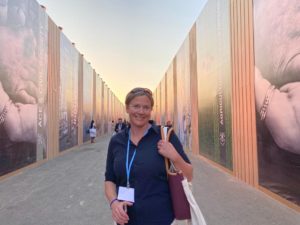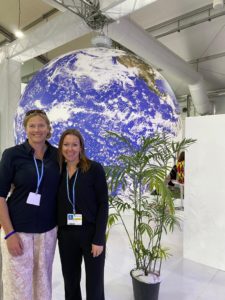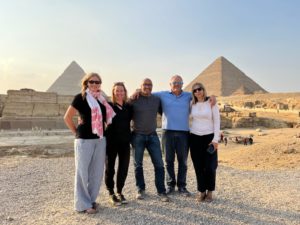
Dr. Colleen Duncan, a veterinarian and associate professor in the Department of Microbiology, Immunology, and Pathology joined four other delegates from Colorado State University in Sharm El-Sheikh, Egypt for the first week of the 27th United Nations Conference of the Parties (COP27) climate summit.
The first faculty member from the College of Veterinary Medicine and Biomedical Sciences to attend the summit, Duncan is passionate about understanding the health impacts of a changing climate and eager to help the CSU and the veterinary community take action.
What motivated you to attend COP27?
“It is important for veterinarians to be aware of and participate in broader climate initiatives, so the chance to attend COP27 was really exciting. I have been thinking a lot about what role veterinarians need to play in tackling climate change and am passionate about empowering young leaders to be change agents in this space. The veterinary professionals of tomorrow need skill sets that were not required of their predecessors.
This year I was selected to train in Al Gore’s Climate Reality Leadership program. There are very few veterinarians that participate in this, but those of us who have came together to form a Veterinarian Climate Reality Leadership group, which is really exciting. Veterinary medicine is a relatively small world and it is important that we address climate change together to make quick progress.”
What set this year’s summit apart?
“One of the main focuses of COP27 was addressing loss and damage. This is a big issue that has been avoided in the past and it involves the development of a fund that supports those experiencing the most common, and the most severe, instances of climate-associated damage. This is really important because the people who bear the greatest burden of climate change have had the least to do with causing the problem.

The message that was most often repeated throughout the summit is that we have solutions, we just need to implement them. Young people especially were being told, ‘you have the right to fix this mess that has been left to you. You have the right to demand change.’”
What was it like to be there in person?
“It was fascinating to watch world leaders talk about their worries, challenges, hopes, commitments, and expectations. It was inspiring to see how engaged people were. And it was powerful to hear stories from people facing immense challenges around the world.
Apart from the main summit, there are many different pavilions running their own programs and all kinds of interesting side events, meetings, and panel discussions happening. It was very conducive for making connections.”
What was most impactful for you?

“I attended everything I could that was about animals and health and spent a lot of time at the World Health Organization’s health pavilion. Their stage was surrounded by a gorgeous art instillation depicting lungs with a quote that said, ‘The price of climate change is paid by our lungs.’
This is a really relevant issue for us here in Colorado. We just had our air quality downgraded to severe, and we’ve experienced terrible wildfire smoke. We know that air pollution kills millions of people worldwide, but we don’t really understand the animal health impacts. At the summit I made several connections in the human and public health space to talk about interdisciplinary collaborations on the ‘air we share.’
The health impacts of climate change fall disproportionately on those who did not cause the problems. Hearing people from island nations and indigenous communities talk about what they are experiencing and challenging the international community to respond was very impactful. As were the messages from young people. As educators, we need to recognize that addressing climate change needs to be infused into everything we do. We are responsible for empowering young people to take control of this situation.”
What is top of mind for you now that you’re home?
“There are a lot of ideas to unpack. I feel the urgency to act.
We are really lucky at CSU. We have a fantastic sustainability program and many initiatives happening across our campus. Many of these are very applicable to our work in the College of Veterinary Medicine and Biomedical Sciences. For example, the Green Labs certification process allows us to continue our research in a more sustainable manner. There are also many ways that we are infusing sustainability into the Veterinary Health System, perhaps most notably in the design of our new veterinary medicine and education facilities and curriculum.
The three pillars of sustainability are social, environmental, and economic. Our profession needs to address all of them. Everyone I met at COP27 was so excited when I told them that I was a veterinarian. We have a role to play in this space. And we do not need to wait, there are ways we can take action today.”